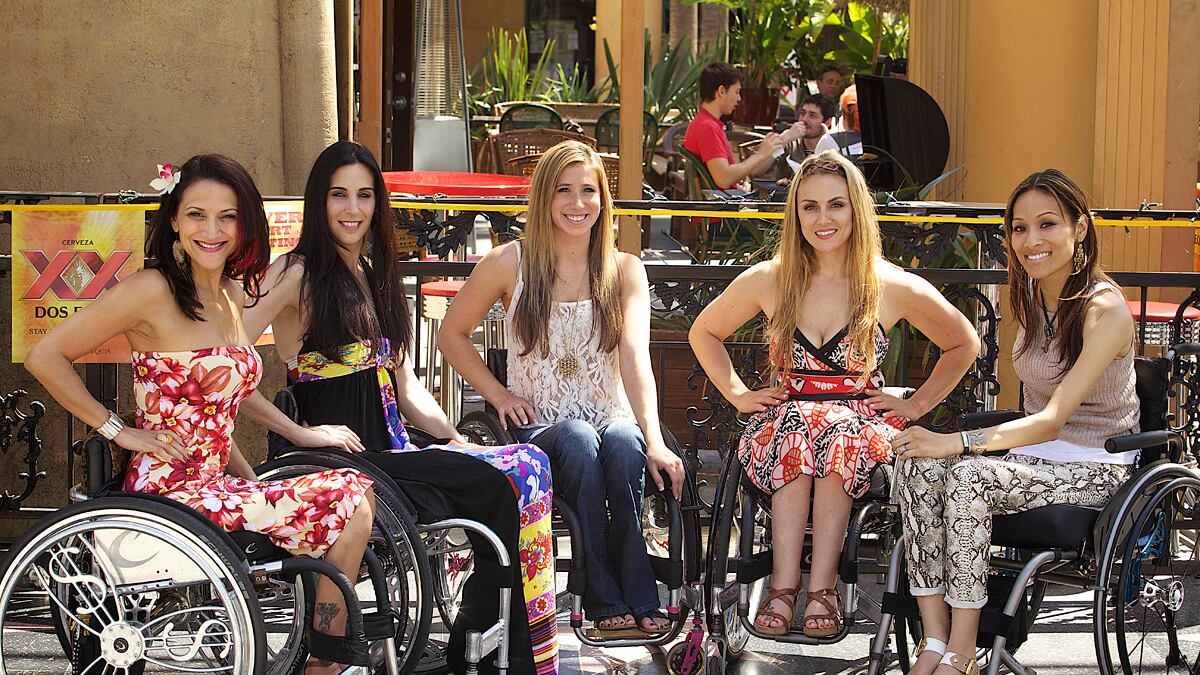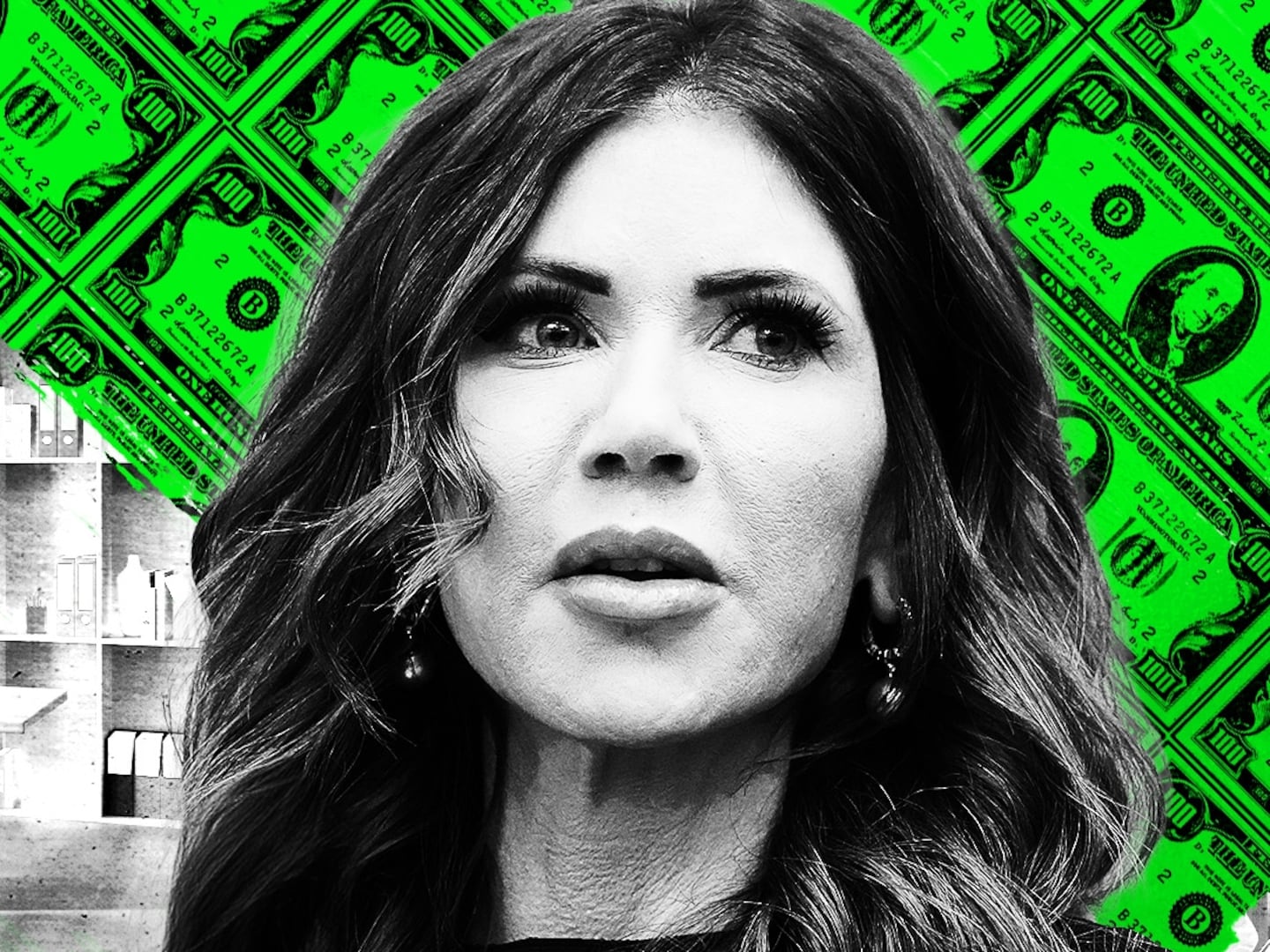When the Push Girls roll into a room, your eyes do not focus on the shiny wheelchairs underneath them. That’s because you really haven’t seen anything like this formidable posse before—five women bonded by the common obstacle life has thrown at them, but even more so by how they’ve chosen to handle it. Gorgeous, joyous, and sentenced to sit for the rest of their lives, it’s easy to comprehend why the Sundance Channel would find them worthy of their own series.
Push Girls, which premieres on June 4, isn’t like other unscripted franchises that put women together in the hopes of headline-grabbing catfights. The show, produced by Gay Rosenthal (Little People, Big World), depicts the reality of living with paralysis and how it doesn’t have to define a person’s life. That may sound really hokey, but spend some time with knockouts Angela Rockwood, Auti Angel, Mia Schaikewitz, Tiphany Adams, and Chelsie Hill, and you might be left pondering how you’ve handled your own setbacks.
“The people in our immediate lives have been able to deal with the paralysis and realize that this is not a tragedy,” said 33-year-old Schaikewitz, who became paralyzed at 15 when an arteriovenous malformation ruptured in her spinal cord. “It’s uplifted us and uplifted them. Only people we’ve had these intimate relationships have experienced it. What’s great about the show is the audience is going to be able to see that, whether they met us in person or not.”
The five women didn’t know each other when they were able to walk but now they’re as inseparable as Carrie Bradshaw and her Sex and the City cohorts. Angel, Schaikewitz, and Adams, who all live in Los Angeles, met serendipitously through Rockwood, a model and actress who became a quadriplegic nearly 11 years ago following a car accident. Two years ago, they all met 20-year-old Hill at a benefit and fast became the older sisters she always wanted.
Over dinner in Beverly Hills recently, the sisterhood was palpable. Funny and vibrant, the women were as quick to tease each other over entrée choices as they were to argue over who looks the most beautiful when she wakes up in the morning. The tears flowed just as easily when the conversation turned to what their friendship means, and not just for the women. Even Chelsie’s father, Jon Hill, and Rockwood’s caregiver, Aunty Judy, became misty-eyed a couple of times.
“It was such a turning point for Chelsie to meet them all at one time,” Jon Hill said. “She’s always been a happy kid, but when she met the girls and we left there, she was singing and dancing in the car. Just pumped up. That’s what I needed to see. Even though she wasn’t depressed, it was just finding that right niche so she wouldn’t be sitting at home in the chair. It’s helped me tremendously being around these ladies.”
The project came together when Rosenthal met Rockwood and she introduced her to her girlfriends. Rosenthal filmed the group as they went about their daily lives and pitched the reel to several networks. Sundance Channel general manager Sarah Barnett said she immediately responded to the show’s unique point of view.

“I have not seen this story told anywhere,” Barnett said. “It was such a great combination for our channel because we had these four incredibly extraordinary women and it had depth, too. It just seemed like a fascinating, but not too earnest, opportunity to see something you haven’t seen before and shed some stereotypes.”
Like its protagonists, Push Girls doesn’t hold back. Viewers will see hip-hop dancer Angel, 42, struggling to get pregnant; Adams, 29, coming to terms with the fact that she’s sexually attracted to a woman; Rockwood, 37, dealing with the aftermath of her separation from her husband (actor Dustin Nguyen, 21 Jump Street) and re-starting her career so she can pay her mortgage; Schaikewitz swimming for the first time in 17 years; and Hill joining Angel’s dance group and performing for the first time.
“Auti taught me something I had not thought about,” Hill said. “She said, ‘You have to figure out how to make the chair work for you and not that you work for the chair.’ When I see all the girls, I see them. I don’t see the chair. They shine above it. And that’s how I want to be. I want people to see me—not the chair.”
More than anything, the series will spotlight the minor role paralysis actually plays in the lives of the women now. “One of my friends thinks I must be so sad sometimes, to just be sitting in the chair,” said Schaikewitz, a graphic designer. “But the chair is just not my focus. I’m sad if I have a bad date. I think people are afraid to approach us and afraid to engage us because they fear they’re going to find something negative. If they would see us in our everyday lives, they would see that this is just—”
“An accessory!” Adams completed the sentiment. The actress became paralyzed at 17 in a drunk-driving accident in which she was the only survivor.
“At first, I felt a lot of pressure—you better do something great with your life now,” she said. “It was my senior year, I was getting ready to be in Hamlet and a re-make of ‘Thriller,’ getting my life in order. And it was just one of those things where I realized how truly grateful and blessed I was to be alive and I wanted to do something truly amazing. But I definitely had my journey. There were times when I wasn’t a bright, shining light. But it’s brought me to where I am today.”
Doctors told Rockwood she would never regain any sensation or movement below the neck, but she says she never believed it. With the help of her father and husband, she kept a journal of positive thinking at her bedside during her rehabilitation and focused on getting better. After a pioneering stem-cell treatment in Portugal in 2003, she was able to operate a manual wheelchair. Although, she can’t move her fingers fully, she is able to feed herself, paint and apply her own makeup.
“From the depths of my soul, this show means so much,” Rockwood said. “When Gay asked me what I wanted from this show, I said, ‘It’s not about me.’ It’s about every single human being dealing with any kind of catastrophic event. Being friends with Tiphany, Auti, and Mia, and later, Chelsie, I had the blessing to learn from them and be inspired. A lot of people don’t get that opportunity. Not everyone has the support that we’ve all had. That’s the miracle.”
As Angel listened to her friend, her eyes welled with tears. “We have survived such a traumatizing experience,” said the former NWA backup dancer who now runs a group for dancers in wheelchairs. “We have been left on this earth and when a severe thing like this happens, you go, Whoa, OK, there’s something bigger than myself that I’m here for. When Sundance offered us this opportunity, it became a platform to relay a message, a message of hope. It’s never too late to fulfill your dreams.”






